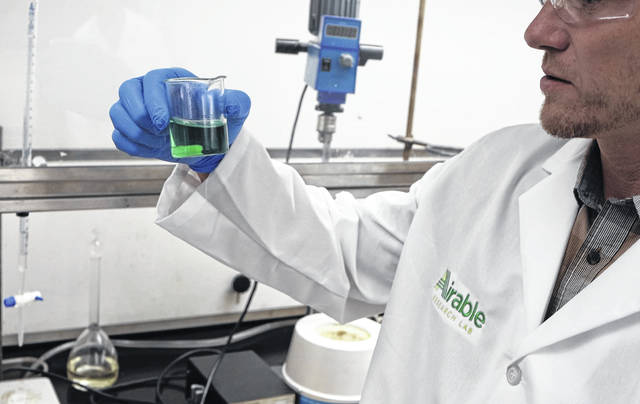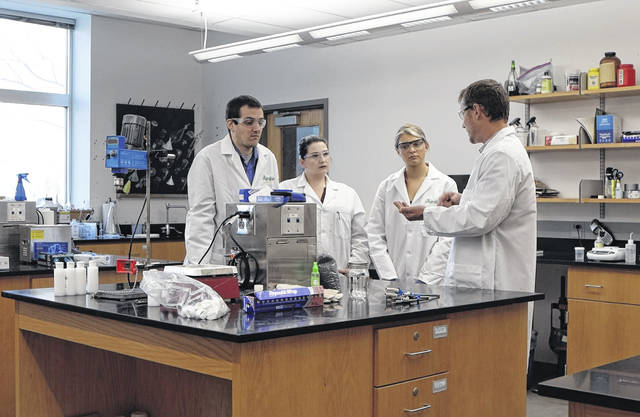

Soybeans continue to lead the way as Ohio’s largest cash crop, and one lab in Delaware is working daily to expand the horizon for the producers of the versatile legume.
Located on the campus of Ohio Wesleyan University, Airable Research Lab was established by Barry McGraw to develop new, soy-based technologies that can then be licensed out for commercial products. The lab is funded by the Ohio Soybean Council, which was founded in 1991 to manage the soybean checkoff. Through the checkoff program, half of 1% of the revenue farmers receive from selling crops is given to the state for funding of research and international marketing.
“Our job is to find organizations, universities, or companies to help us create demand for soybeans or create innovative solutions for soybeans,” McGraw said. “The Ohio Soybean Council funds it, and myself and my team, we develop chemistries that utilize soy. Maybe it’s a coating, maybe it’s a foam, a surfactant that may go in soap or paints. And then we license that technology to a commercial company that would then manufacture it and use a lot of soy.”
McGraw has been working in research and development for 22 years, and his previous work with Battelle Memorial Insititute in Columbus aided in the creation of a soy-based toner that was licensed to Mitsubishi, as well as a soy-based plasticizer originally licensed to Ohio-based PolyOne and currently used in a wide range of products such as flip flops.
At the time, the Ohio Soybean Council was funding the research at Battelle. Now, the council is funding its own lab on the OWU campus in order to “cut out the middle man,” McGraw said. The lab features a team of five full-time employees and several more part-time workers.
“We’re able to do more research for less money,” he said of the council-funded Airable Research Lab. “We can probably do three to four times more research hours for the same dollar. That’s one huge advantage.”
Additional advantages of having their own lab include having a direct connection with commercial companies to create more fruitful conversations on ideas and provide technologies to those companies quicker. The lab also allows farmers to be more engaged in the work. “They can visit our lab, they can touch the stuff, and they understand it better,” McGraw said of farmer interactions.
No matter the topic of discussion relating to his work, McGraw’s words always seem to steer back to one thing: giving farmers more bang for their buck.
“That’s the whole point,” he said. “We try to license things because we want to do more research and make the farmers’ money go further.”
Among some of the current projects currently being worked on at the Airable Research Lab are plasticizers for polyvinyl chloride (PVC), extracting rare-earth elements from coal ash with a soy-based product, pressure-sensitive and biodegradable adhesives for labels, and soy-based sealants. McGraw said one of the more “active” projects his team is currently working on is a concrete sealant for chimneys.
The idea for the sealant came from working with Mike and Todd Feazel, two brothers who created Roof Maxx, a company focused on the restoration of old roofing. McGraw said that while contractors are restoring a roof, they could also seal the chimney much in the same way someone would seal tiles with grout. The lab has also created and licensed a soy-based emulsion that is sprayed on roof shingles to make them more flexible after years of weathering, helping to extend the life of roofs.
During the pandemic, as hand sanitizers have become prized commodities, Airable also developed its own sanitizer made from high oleic soybeans. McGraw said the sanitizer kills germs equally as effective as other products on the market, but with the soy base, it won’t dry out hands in the same fashion as many other sanitizers.
That his lab is solely dedicated to working with soy in the technologies they develop is anything but common, McGraw said when asked about the existence of similar labs around the country.
“I don’t know of any labs in the United States that just focus on soy-based development and, specifically, that are managed by the checkoff program,” McGraw said. “There are some that work more on the plant side, but it’s more analytical … The fact that we’re 100% soy, I’d say that’s rare.”
Asked what he most enjoys about being in the lab every day, McGraw’s thoughts once again boiled down to the farmers who make Ohio the seventh-largest soy producer in the country.
“I like working for the farmers,” McGraw said. “They have an entrepreneurial spirit, they work hard, and their kind of experimental research is a good compatibility with me.”
McGraw added that producing products that people are going to use is equally as gratifying and something that fuels the daily research, as is finding new ways to utilize soy. He said farmers are often taken aback by the volume of uses for their crops, but then again, so is he.
“Sometimes it even surprises me,” McGraw said.



